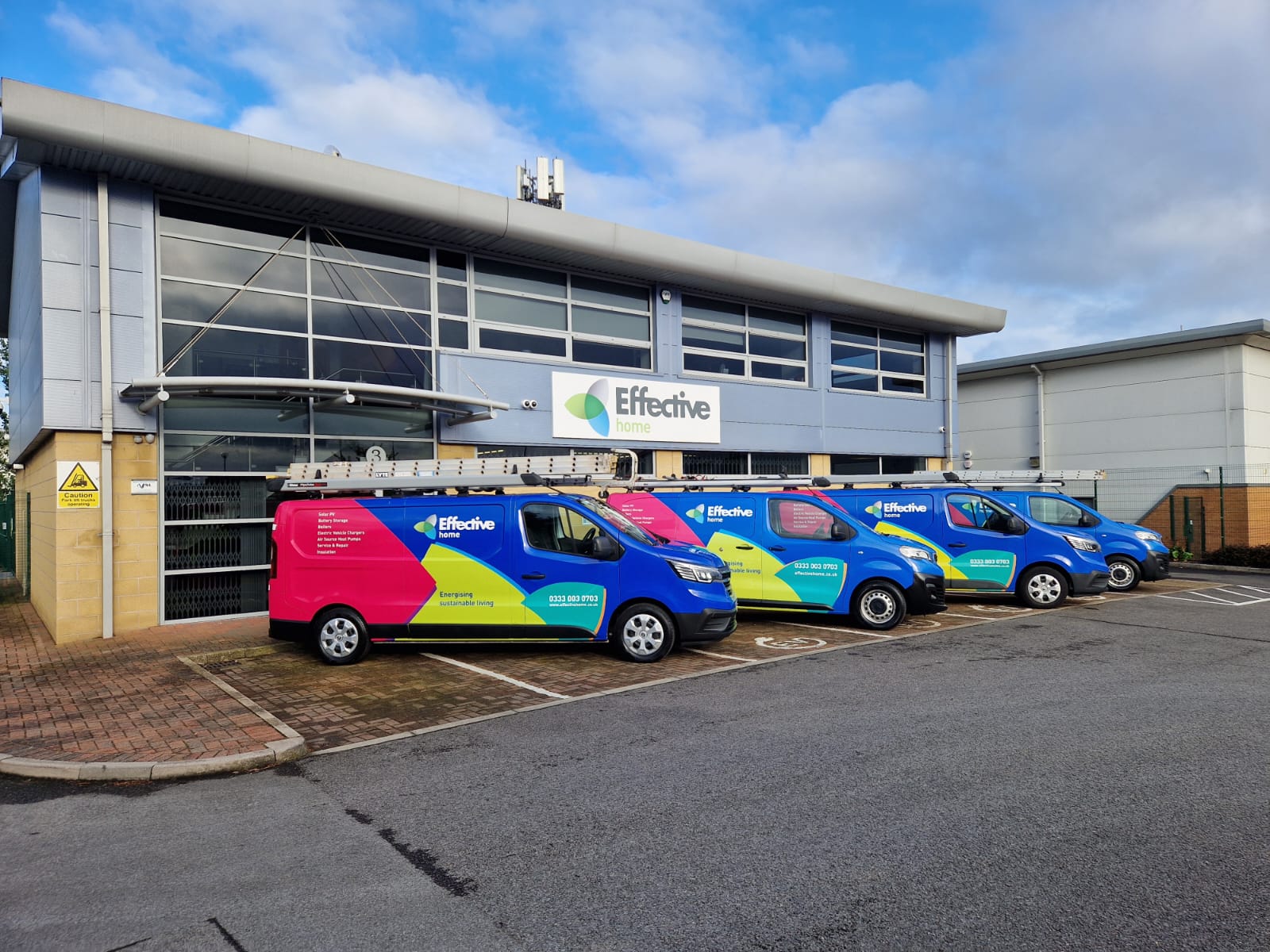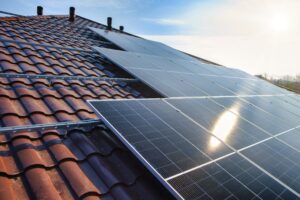Are you looking for ways to optimise the amount of solar energy you can use at your home? Then you should consider investing in a solar battery storage solution. Whether you are investing in a solar PV system to help reduce your energy bills, or because you want to be more environmentally friendly, a solar battery will help you maximise your return on investment.
Our expert solar battery installers at Effective Home have helped us put together a guide that will cover the following: what a solar battery is, the key factors to consider when purchasing a solar battery, the pros and cons of solar batteries, how much they cost, what size battery you may need, and how long they last. Additionally, we have also outlined our top five best solar battery picks depending on storage, capacity, price, warranty, and efficiency. If you’re looking for the best solar batteries on the market today, you’ll find them below.
What Do Solar Batteries Offer?
The solar battery is a fundamental, yet optional, element of any solar panel system. Instead of using the power your solar panels produce instantly, a solar battery can store excess electricity to be used at a later date. How much electricity it can store depends on the battery capacity. Additionally, solar batteries can also store energy from the National Grid, which can save you money if you charge the battery outside of peak times.
Even if you have an existing solar panel system, but do not own a solar battery, you can add one into your system afterwards. The primary aim of solar batteries is to fully utilise the power your solar panels generate, especially during time periods of poor sun exposure and in the evenings.
Types Of Solar Batteries
When it comes to types of solar batteries that are available on the market, there are four main types. These are: lithium-ion, lead-acid, flow, and nickel-cadmium batteries. The latter two are more commonly found in industrial settings, and are not particularly suitable for residential use. Taking this into consideration, we will focus on lithium-ion and lead-acid batteries.
Lithium-ion Solar Batteries
The most common form of solar batteries used in residential properties are lithium-ion batteries. They are both compact and powerful, making them perfect to power household’s with high energy demands, but a small amount of available space. Additionally, they are also low maintenance and have a high percentage when it comes to depth of discharge.
However, this raft of benefits comes with one major drawback. Lithium-ion solar batteries can be quite expensive. They are also known to be temperamental as they have a tendency to overheat, and if installed incorrectly they could even cause a fire.
Lead-acid Solar Batteries
One of the oldest forms of batteries are those made out of lead-acid, and their longevity is a huge selling point when it comes to purchasing these solar batteries. Typically cheaper than their lithium-ion counterparts, lead-acid solar batteries have a longer lifespan than other battery types. Additionally, the technology surrounding these types of batteries is better understood.
Compared to other batteries on the market, however, lead-acid batteries have a lower energy density and efficiency rating.
- Create a Tailored Quote Based On Your Circumstances
- Takes Less Than 2 Minutes
- Fixed-Online Quotes

Our Top Five Picks Of The Best Solar Battery Storage Solutions
See which batteries we could potentially install for you below:
Best Overall: Sunsynk L5.1
While the Sunsynk L5.1 solar battery may have one of the smallest usable capacity amounts out of our top five picks, it is the perfect customisable system that can help you build the exact amount of capacity you wish your solar battery to feature. In addition, it is one of the most affordable solar batteries on our list, and also boasts a compact design.
The ability to build a battery storage system that works for you makes this our top pick, and Sunsynk are such a well-known name in the solar battery space that we here at Effective Home consider any Sunsynk battery to be an excellent choice.
Key Specs Of The Sunsynk L5.1
| Sunsynk L5.1 | |
| Category | Specs |
| Total storage capacity | 51.2kWh |
| Usable capacity | 4.61kWh |
| Operating window | -20°C to 55°C |
| Depth of discharge | 90% |
| Dimensions | 440 x 620 x 135mm |
| Warranty length | 5 years |
Best Capacity: Tesla Powerwall 2
Known for its high efficiency level and powerful performance, the Tesla Powerwall 2 is one of the best known solar batteries on the market. With its high capacity stats and depth of discharge, as well as its ability to connect up to 10 batteries together, this solar battery from Tesla is the perfect option for larger households or families with higher energy demands.
However, the Tesla Powerwall 2 is one of the most expensive solar batteries on the market, so opting for this model is quite the investment. Additionally, the power monitoring technology available with this battery (which you can control via your smartphone) is known for being quite temperamental.
Note: The newer Powerwall 3 model does a
ddress some of these issues, and you can read about its key specs in our Tesla Powerwall Review.
Key Specs Of The Tesla Powerwall 2
| Tesla Powerwall 2 | |
| Category | Specs |
| Total storage capacity | 14kWh |
| Usable capacity | 13.5kWh |
| Operating window | -20°C to 50°C |
| Depth of discharge | 100% |
| Dimensions | 1,150 x 753 x 147mm |
| Warranty length | 10 years |

Best Price: LGES 16H Prime
If price is your biggest concern whilst you are shopping around for the best solar battery for your household, then look no further than the LGES 16H Prime. While it may be one of the more cost effective batteries available on the market, it does not compromise on performance. With a high compatibility rating, sizable and usable storage capacities, and a good efficiency rating, the LGES 16H Prime appears to have it all.
One of the only drawbacks of this battery is that it has limited modularity. Meaning if you wish to expand the capacity level of your battery, perhaps you are using more electricity than usual or your family has grown, you won’t be able to do so. This is not a battery that can grow with you.
Key Specs Of The LGES 16H Prime
| LGES 16H Prime | |
| Category | Specs |
| Total storage capacity | 16.0kWh |
| Usable capacity | 16.0kWh |
| Operating window | -20°C to 50°C |
| Depth of discharge | 100% |
| Dimensions | 504 x 1086 x 295mm |
| Warranty length | 10 years |
Best Efficiency: Generac PWRcell Solar Battery
While Generac does not currently produce solar panels, the company has created one of the most efficient solar batteries available on the market. In particular, the Generac PWRcell solar battery is marketed towards individuals that currently live off-grid, but it is still a decent option for those that also live on-grid.
The main drawback of this solar battery is its depth of discharge, which is quite low when comparing it to other solar batteries on the market. Additionally, you may experience compatibility issues with this battery, so ensure that it will work with your solar panel system if you opt for this model.
Key Specs Of The Generac PWRcell Solar Battery
| Generac PWRcell Solar Battery | |
| Category | Specs |
| Total storage capacity | 3.00kWh |
| Usable capacity | 3.00kWh |
| Operating window | -10°C to 50°C |
| Depth of discharge | 84% |
| Dimensions | 440 x 450 x 86mm |
| Warranty length | 10 years |
Best Warranty: Sonnen EcoLinx 30
Our final option is perfect for those that are quite cautious when it comes to purchasing high-value products. Featuring virtual power plant technology, which offers you the potential to earn extra money, the Sonnen EcoLinx 30 has one of the largest warranties available on the market at 15 years. This will more than likely cover the entire predicted lifespan of your solar battery.
However, the EcoLinx 30 suffers from a low efficiency rating which could negatively impact the amount of power you receive from the system. Additionally, it is also one of the more expensive solar batteries on our list so it’s worth weighing up the pros and cons before making any final decision.
Key Specs Of The Sonnen EcoLinx 30
| Sonnen EcoLinx 30 | |
| Category | Specs |
| Total storage capacity | 30kWh |
| Usable capacity | 30kWh |
| Operating window | 5°C to 45°C |
| Depth of discharge | 100% |
| Dimensions | 1320.8 x 1549.4 x 482.6mm |
| Warranty length | 15 years |
Key Factors To Consider When Purchasing A Solar Battery
There are a variety of key factors, and even terminology, that you should fully understand before purchasing a solar battery. Below, we have included a variety of key factors and terms that will help you to understand what each battery is offering in terms of storage quality and performance:
- Usable capacity: When you are looking at a solar battery’s spec sheet, you will notice that there are two different capacity amounts. The first one you may see is ‘usable capacity’. If you were to drain 100% of your battery’s capacity, it can end up damaging the battery and shorten its lifespan. This is why solar battery manufacturers will include a recommended usable capacity, which will be the amount of power you can drain from the battery without damaging it.
- Total capacity: It is important that you do not confuse the ‘usable capacity’ and the ‘total capacity’ stats, as you may find yourself either purchasing a battery too big or too small. The total capacity spec relates to the maximum amount of energy your battery can store. But that might not necessarily mean you can drain all that power at once.
- Depth of discharge rating: An easy way to see how much of a solar battery’s power you can utilise is to check for the depth of discharge rating. It will often be presented as a percentage, and it represents the amount of usable capacity you can use compared to the maximum capacity.
- Battery modularity: According to Forbes, on average a solar panel system will last between 25 to 30 years. It is safe to say, during such a long time period, the circumstances surrounding your household may change. Whether it is the introduction of new family members or people moving out, your power usage will vary. In order to ensure your solar battery continues to fulfil your needs, you should research the modularity of any given battery. Look into whether you can upgrade the same battery, if you would need to buy a new battery, or if you can hook up multiple batteries to work together.
- Compatibility: Not all solar batteries are compatible with all solar panel systems, so it is of the utmost importance that you ensure that the two are compatible. Otherwise you will not be able to use the storage solution.
- Warranty length: Most solar battery suppliers will include a 10 year warranty on their products. Due to the expensive nature of solar batteries, you will want to maximise your warranty length to provide you with protection if you face reliability issues or if your battery gets damaged later down the line.
- Battery cycles: Sometimes warranties will be related to the amount of cycles your solar battery completes rather than years of usage. This relates to the amount of times you need to charge your battery after draining it of its power, which is also known as a battery cycle. When researching a given solar battery’s cycle amount, you should ensure it is around the 4,000 to 6,000 cycle range.
- Create a Tailored Quote Based On Your Circumstances
- Takes Less Than 2 Minutes
- Fixed-Online Quotes

Are Solar Batteries Worth It?
If you are passionate about installing a solar panel system on your property, then purchasing a solar battery will help you fully optimise your usage levels. Not only will it further help you reduce your energy bills, but you can also minimise your carbon footprint. Typically, a solar panel system that includes a solar battery – and therefore is able to generate excess electricity in return for SEG payments – will generate for a household around £600 in annual savings (Source: Energy Saving Trust).
This section of the article will further delve into the various benefits and drawbacks related to purchasing a solar battery.
Benefits Of Solar Batteries
| Pros of solar batteries | |
| Pro | Explanation |
| Reduce your energy bills | Whether you are purchasing a solar panel system for the first time, or simply adding a solar battery to your already existing system, purchasing a solar battery will maximise the amount of generated solar power you can use. This will, in turn, reduce your energy bills. |
| More environmentally friendly | Compared to relying upon the National Grid, which is mostly powered through the burning of fossil fuels, using solar panels and your solar battery to power your home is more environmentally friendly and sustainable. |
| Manage your power usage | Using a solar panel system without the presence of a solar battery greatly limits your ability to manage the amount of power you are able to use. Claim back that power by purchasing a solar battery and use your solar electricity when you require it. |
| Back-up power source | Having a solar battery is the perfect back-up power source option as it can protect you from any power outages or power supply issues that the National Grid may experience. |
| Freedom from the National Grid | Building upon the previous point, as well as not being vulnerable to power supply problems, you will no longer be kept captive by energy price spikes. |
Drawbacks Of Solar Batteries
| Cons of solar batteries | |
| Con | Explanation |
| High initial costs | We will delve further into the prices of solar batteries below, but they tend to feature quite high initial costs. |
| Takes up space in your home | While solar panels tend to be out of the way on the roof of your property, you will need to make room for your solar battery system to be installed in your home. |
| Increases the yearly inspection and maintenance your solar panel system requires | While solar batteries are relatively low maintenance, they will need to be subject to yearly inspections in order to ensure its efficiency level as well as your personal safety. |
| You will need at least two solar batteries during your solar panels expected lifespan | The typical lifespan of your solar panel system is around 25 to 30 years. However, your solar battery will only last between 5 to 15 years. Meaning you will more than likely have to purchase multiple batteries within your system’s lifetime. |
What Size Solar Battery Do I Need?
There is no sure method to work out what size solar battery you will require to power your home. This is because every household is different, and there are significant impacts that can affect your power usage and requirements. Factors that can impact the size of the solar battery you will require includes:
- The size of your household.
- The size of your property.
- How much electricity your household uses.
- The location of your property.
- How much sun exposure your property receives.
- What your solar battery budget is.
In order to give you a brief overview on what solar battery size different household’s require based off of the size of the property, we have included the table below:
| What size solar battery do I need to power my home? | |
| House size | Recommended solar battery size |
| 1 bedroom | 2 kWh |
| 2 bedrooms | 4 kWh |
| 3 bedrooms | 8 kWh |
| 4 bedrooms | 9.7 kWh |
It is important to note that the figures included in the table above are simply for guidance. If you are looking for specific information related to your household, then why not get in touch with Effective Home? One of our solar battery experts can help you find out what size solar battery you will require to power your home.
Can I Use Multiple Solar Batteries?
Yes, if you wish to add multiple solar batteries to your solar panel system then you are able to do so. In fact, there is no limit to the amount of solar batteries you can connect to your system – so long as the solar battery you choose allows for modularity. While you are able to run multiple batteries, it may not be the best course of action. There are a variety of drawbacks that come along with running multiple batteries, including:
- The more solar batteries that are present in your solar panel system, the longer it will take to charge each battery.
- If you have many solar batteries, you are increasing the risk of there being a fault or failure which could negatively impact the amount of power your household receives.
- You may need to purchase more solar panels in order to charge the batteries on the system.
- If you do not use the entirety of the power your new solar batteries provide, you may see a decrease when it comes to return on investment.
Instead of purchasing many solar batteries, it is recommended by solar battery manufacturers that you purchase one or two high capacity batteries that will fulfil your power requirements. If you need further guidance regarding the amount of solar batteries your household may need, then the experts at Effective Home can help you: reach out today.
How Much Do Solar Batteries Cost?
The initial cost of solar batteries can vary massively depending on a variety of different factors, including: the type of battery, the brand, total and usable capacity levels, depth of discharge, warranty, predicted lifespan, and efficiency level. With so many variables, it is understandable that solar batteries can vary in price, but will typically stand anywhere between £1,000 and £10,000.
Below, we have included a table demonstrating how much you may spend on a solar battery depending on the size of your property:
| How much do solar batteries cost? | ||
| Property size | Recommended solar battery size | The average cost of solar batteries |
| 1 to 2 bedrooms | 4 kWh | £2,500 |
| 3 bedrooms | 5 kWh | £4,500 |
| 4 or more bedrooms | 10 kWh | £8,000 |
The figures included in the table above are only a guideline. One of our solar battery experts can provide you with specific costing information.
How Long Do Solar Batteries Last?
As we have previously mentioned, solar batteries tend to have a predicted lifespan of between 5 to 15 years. This is significantly lower than the average lifespan of a solar panel system, which lies between 25 to 30 years, with some systems lasting as long as 40 years+.
Due to the significant gap between these two lifespans, it is expected that most people will need to purchase more than one solar battery during the lifetime of their solar panel system. However, one positive factor to note is that most solar batteries will feature a warranty that will cover most, if not all, of its predicted lifespan, so if it gets damaged before it ought to, you could get a repair or replacement for free.
Best Solar Battery Storage Summary
We understand that choosing the right solar battery storage solution to connect to your solar panel system can seem like a daunting and difficult task. Especially taking into consideration the initial expense, as well as the length of time the battery will be present in your home. The four key storage factors you should take away from this article and research when analysing potential batteries, are the:
- Total maximum capacity.
- Usable capacity.
- Efficiency rating.
- Depth of discharge rating.
Don’t forget our top five solar battery storage picks, too:
- Best Efficiency: Generac PWRcell Solar Battery
- Best Warranty: Sonnen EcoLinx 30
- Best Price: LGES 16H Prime
- Best Overall: Sunsynk L5.1
- Best Capacity: Tesla Powerwall 2
Are you ready to optimise your solar panel system by purchasing a solar battery? If you are still trying to figure out which solar battery storage solution is the best choice for you and your household, then work with Effective Home today. Our solar battery experts can help you make the best decision for you.
- Create a Tailored Quote Based On Your Circumstances
- Takes Less Than 2 Minutes
- Fixed-Online Quotes




